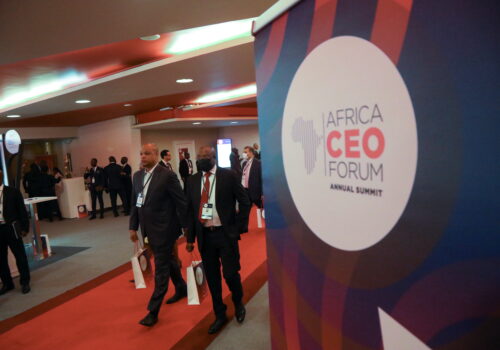Emerging and developing economies are already feeling the impact of the trade war and economic downturn.
That was made clear at this year’s International Monetary Fund and World Bank Spring Meetings, where financial leaders warned about job loss and increasing poverty rates across these countries.
But there are changes African countries can make to better withstand the economic headwinds they are facing. One such opportunity they should immediately seize lies in strengthening their approaches to combating money laundering and terrorist financing. By addressing deficiencies in legal and regulatory frameworks and by adjusting for developments in financial technology, African countries can bolster financial inclusion and tap economic growth opportunities—while preventing the abuse of the global financial system by nefarious actors.
Key deficiencies seen across Africa—in the form of weak legal and regulatory frameworks, limited institutional capacity to conduct financial supervisory or enforcement activities, and a high degree of informality of economic activities—make it difficult to combat money laundering, terrorist financing, and other illicit financial flows. The Financial Action Task Force (FATF), a global money laundering and terrorist financing watchdog, keeps track of jurisdictions that do not meet global standards to combat money laundering, publicly identifying jurisdictions with weak performance on a “black list” and “grey list.” The black list hosts only three countries (North Korea, Iran, and Myanmar), but on the grey list, fourteen of the twenty-five countries (just over half) are African. Grey listing can result in serious reputational and economic damage, with negative spillover effects on economic growth, borrowing costs, foreign investment flows, and financial inclusion efforts—a particularly concerning impact considering that in Sub-Saharan Africa, less than half the population has a bank account. Given these effects, African countries have worked to make significant improvements to their anti-money laundering and combating the financing of terrorism (AML/CFT) frameworks. Over the past few years, several countries that were once placed on the grey list have been removed, including Zimbabwe, Botswana, Morocco, and Mauritius.
One piece of the regulatory puzzle involves cryptocurrencies. FATF Recommendation 15 for combating money laundering and terrorist financing directs countries to identify and assess “risks emerging from virtual asset activities.” FATF data from March indicates that of the forty-one Sub-Saharan African countries with publicly available data, only seven countries were rated “compliant” with Recommendation 15, indicating that the country successfully met the global standard. For African countries looking to become more compliant, there are positive examples on the continent to draw upon; for example, South Africa was recently upgraded to “largely compliant” with Recommendation 15 and is continuing to make progress towards full compliance.
At the same time, African governments must also harness the power of digital finance to weather today’s economic headwinds. According to the International Monetary Fund, as of 2022, just 25 percent of countries in Sub-Saharan Africa formally regulated cryptocurrencies, and two-thirds had implemented restrictions, with six countries having outright banned cryptocurrencies. The impact of this approach leaves the investors and entrepreneurs who are interested in Africa’s digital assets sector inclined to hold back investments due to the excessive regulatory uncertainty and possible regulatory swings. Africa is one of the fastest-growing crypto markets in the world, and crypto assets are actively used across the continent.
Recent reporting from Chainalysis suggests that the cryptocurrency value received by Sub-Saharan Africa was less than three percent of the global share between July 2023 and July 2024. While this is a small global share, there is significant variance in adoption rates across the continent’s fifty-four countries, with a number of countries still rating relatively high in global adoption: Nigeria ranked second worldwide, and Ethiopia, Kenya, and South Africa also ranked in the top thirty countries. From 2022 to 2023, bitcoin was legal tender in the Central African Republic, but finance experts raised concerns about the lack of electricity and infrastructure and the high risk of money laundering and terrorist financing. One thing is certain: digital assets—including cryptocurrencies—are changing the financial landscape of the region.
That digital finance can transform Africa’s financial landscape should be viewed positively. Africa’s population is set to increase from 1.5 billion in 2024 to 2.5 billion in 2050. This is the moment for African governments to leverage the economic power of their demographics, but to do that, they will need to consider public policies that support greater financial inclusion. Of the eight countries that will account for more than half of the global population growth between now and 2050, five of them are in Africa; two of them are global leaders in crypto adoption rates.
As populations age and enter the workforce, African governments should consider how best to promote technological innovation in their societies, including in financial technology. Cryptocurrency adoption in African countries can be used for small retail transactions, for sending or receiving remittances, as a hedge against inflation, for business payments, and, potentially, for solving sticky foreign exchange issues in places such as Central Africa, where such issues dramatically reduce foreign investments. Due to its decentralized nature, cryptocurrencies can help people bridge the gap in access to financial services and formal banking systems in many countries across the continent.
On one hand, governments have tried to use digital assets to boost financial inclusion, tax revenue, and small retail transactions with limited success; and on the other, countries have banned, unbanned, regulated, and deregulated cryptocurrencies, leaving a patchwork of regulatory frameworks across the continent for consumers and business to navigate. With such jurisdictional regulatory arbitrage and limited enforcement mechanisms, nonstate actors, including terrorist groups in Africa, are able to take advantage of the technologies and services that can move money the fastest and cheapest—and in ways that are least likely to be detected or disrupted. That can lead these actors to cryptocurrency.
While serving as head of delegation to both the Central and West African FATF-style regional bodies, I heard from African government officials repeatedly that there were no digital assets being used in their countries and that their AML/CFT regulatory regimes were sufficient. This is simply not the case. African countries should consider policies to encourage the adoption of emerging financial technologies, including cryptocurrencies and other digital assets, while still exercising great care to avoid creating conditions allowing for regulatory arbitrage between countries or monetary unions that can be exploited by bad actors seeking to launder money or finance terrorism. Beyond policy frameworks, African governments should empower their enforcement agencies with the appropriate resources to ensure that policies, laws, and regulatory frameworks protect the integrity of the global financial system.
Benjamin Mossberg is the deputy director of the Atlantic Council’s Africa Center.
Sign up to hear about upcoming Africa Center events

The Africa Center works to promote dynamic geopolitical partnerships with African states and to redirect US and European policy priorities toward strengthening security and bolstering economic growth and prosperity on the continent.
Further reading
Fri, May 2, 2025
To redefine US-Africa engagement, Washington must recognize the power of the African diaspora
AfricaSource By
Embracing the digital identity economy will allow the US to shape a mutually beneficial partnership with African countries.
Tue, May 6, 2025
The next pope may be African—or not. Either way, Africa is at the forefront of today’s Roman Catholic Church.
New Atlanticist By Alexander Tripp
An African pope is not a given in this conclave or the next, but African agency and leadership in the twenty-first-century church is.
Thu, Apr 10, 2025
African leaders must not miss their chance to jumpstart the continent’s business environment this May
AfricaSource By
As Africa navigates a shifting global landscape, the private sector must help develop strategies that reduce external dependency, enhance regional collaboration, and prioritize sustainable investment.
Image: Representations of cryptocurrencies are seen in this illustration in a picture taken on August 10, 2022. Illustration via REUTERS/Dado Ruvic.



